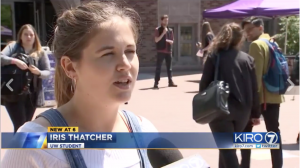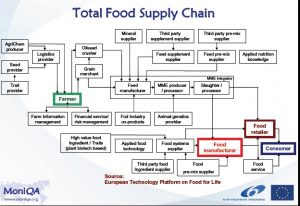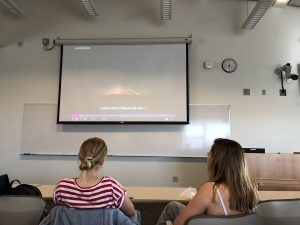I’ve always had a political and economic emphasis when it comes to how I analyze course material. With that being said, I knew that addressing trade for my group project would be useful in examining how political economy relates to food and the environment. As a result, I was excited to find a group of peers with a similar sort of mindset as me, but also with different perspectives of the topic itself. Initially, we had planned to host a workshop on trade with the Community Alliance for Global Justice (CAGJ) and a movie, but our final path led us to just showing the movie, We Feed the World, that is directed by Erwin Wagenhofer.
Even with the obstacles in scheduling meeting times, reserving a room, and getting people to attend the event, I think we would all agree that the project was a success. We were able to table the event at the HUB and generated a good amount of interest for our topic and the movie. Even though many people would try to avoid us while we were handing out fliers, individuals that did engage with us asked a lot about how trade relates to different food and environmental issues (and interestingly enough, I was interviewed by Kiro 7 about the Seattle head tax while we were tabling).

Me being interviewed for Kiro 7. If you look closely in the background, you can see my group tabling.
During the movie showing, we had a turnout of about 15 people and held a discussion at the end about what they gained from watching it. It was rewarding to hear that the attendees had not only enjoyed the movie, but also learned about how topics like waste, commercial fishing, industrialized food, poverty, genetically engineered seeds, monocropping, and meat production were all related to globalized trade. What I found interesting about this was that people would mention aspects of the movie that I didn’t notice. For example, one of my group members pointed out how the movie starts at the bottom of food production with small farmers and fisherman and moves its way up to the top with the CEO of Nestle. This reminded me of our lecture on “Globalization of the World Food Economy.” More specifically, it made me think about the graph pictured below and how the “real winners” of food trade and production are brand-name manufacturers (Litfin, 4/12/18).

Just as we set out to do in this class, We Feed the World captured contemporary food trade holistically and revealed many hidden consequences that linger within it. Working on this project has taught me not only how hard collective action can be, but also how rewarding it can be in teaching the community, even if only for a few minutes, about how integrated our world food system is.

My friend Lorrin and I at the event.

Hey Iris,
Congratulations on your action project! And very cool you had the opportunity to be interviewed by the news. I commend your approach to your project topic, since trade is such a complex and expansive subject the use of an overarching movie is smart. I am wondering what topics you chose to cover in the discussion? What solutions did your group come to? I recall seeing the movie back in high school and it being quite factual. Did our class in addition to the information provided by this documentary further thinking? I also wonder if you have any criticisms of this movie choice now that it is thirteen years old. I wonder if much has changed for the better, or, unfortunately a more likely option, for the worse. Your blog post about your project has inspired me to add the documentary to my queue for once finals are over, so please consider your total audience for the group project to be sixteen!
third blog response:
Hey Iris!
Your action project seemed really cool! My groups topic was also on trade. We orignially had wanted to do a faculty panel to talk about the recent turmoil that Trumps tariffs on steel and aluminum had placed on the US food market, but a couple days later I recieved a notification that UW was already holding a faculty panel on that very topic! So instead my group decided to do podcast. We had two speakers, one is the coffee head and expert at the UW and the other speaker was from the Washington Fair Trade Coalition. SImiliarily much of our podcast kept relaying back to the topic of globalization. I found it very interesting personally how little I knew about the effects of the global food market. Being very ‘pro international cooperation’ I believed the more globalization the better, however the more I dive into the topic the more I realize that there are massive inequities in both trade agreements and the market itself. The system of explotation that has been put into place has had major impacts on smaller developing countries for the benefit of major food producers. However I think both of our aciton projects are a good start to bringing more attention to the issue!
-JAPNA
Response #3
Really liked this blog post reflecting on your action project Iris! Your topic of trade and political economy is something I have written about as well and I think is vitally important for understanding political ecology. Trade wars, in particular, are vitally important to understand in today’s world with precarious economic situations in many countries around the world. For instance, Spain just ousted its Prime minister and the Italian president blocked the formation of an anti-European Union coalition which in turn caused massive upheaval. These events in Europe combined with the trade war between the U.S. and China means that global markets are going to fluctuate rapidly. This fluctuation is going to affect food prices and the erratic change is going to mean it may be hard for poorer people to have access to food. This lack of access could turn into cause more political turmoil as starving people usually try to remove the governing body they live under if conditions get drastic enough, examples of this are the Arab Spring in 2010 or Liberian rice riots in 1979. The way your group project turned out is very cool. They way your movie event was able to cover topics in political ecology from economics to engineered seeds is great. I think it was also really cool how people were able to take different things out from the movie and a good dialogue happened. and you got to be on TV!